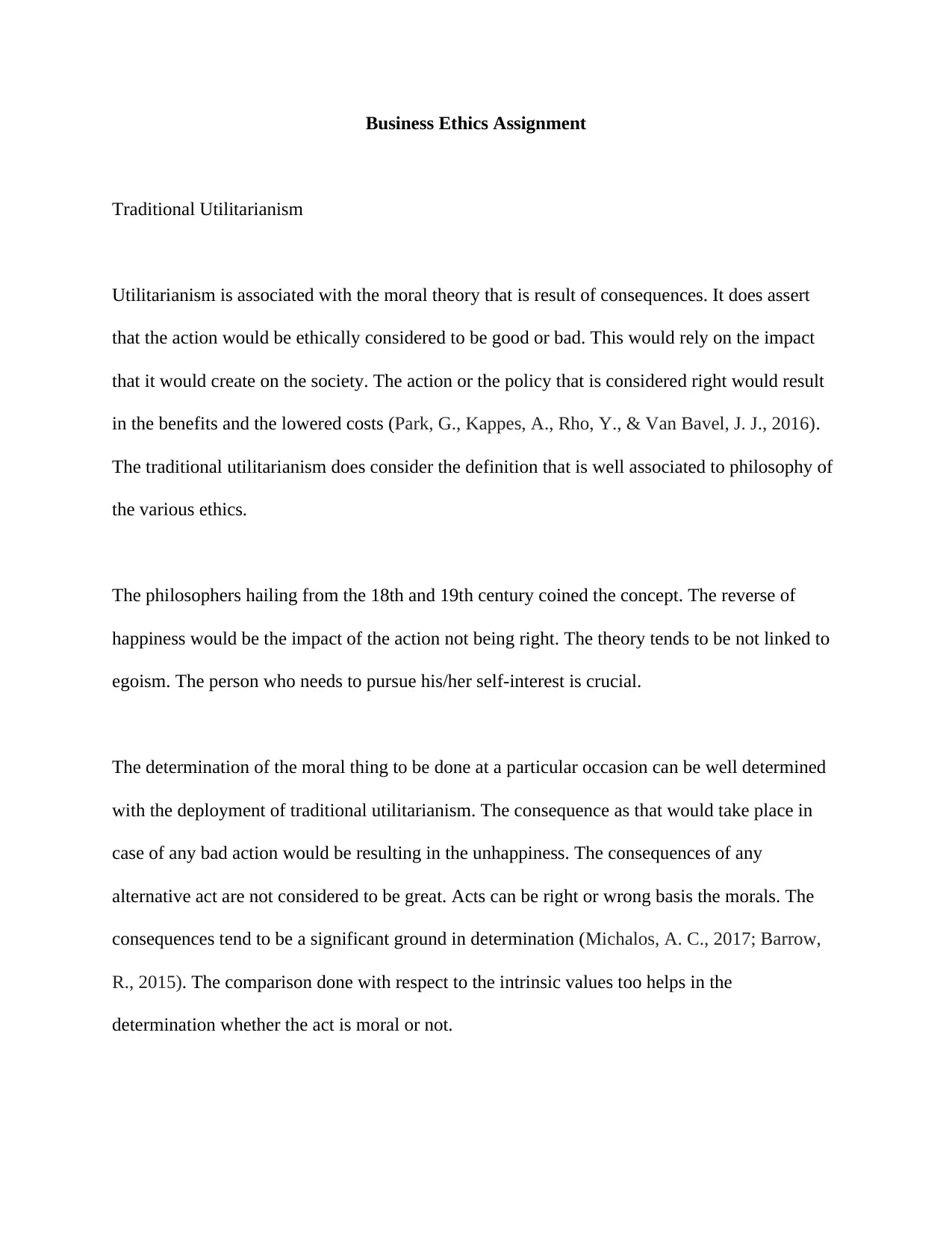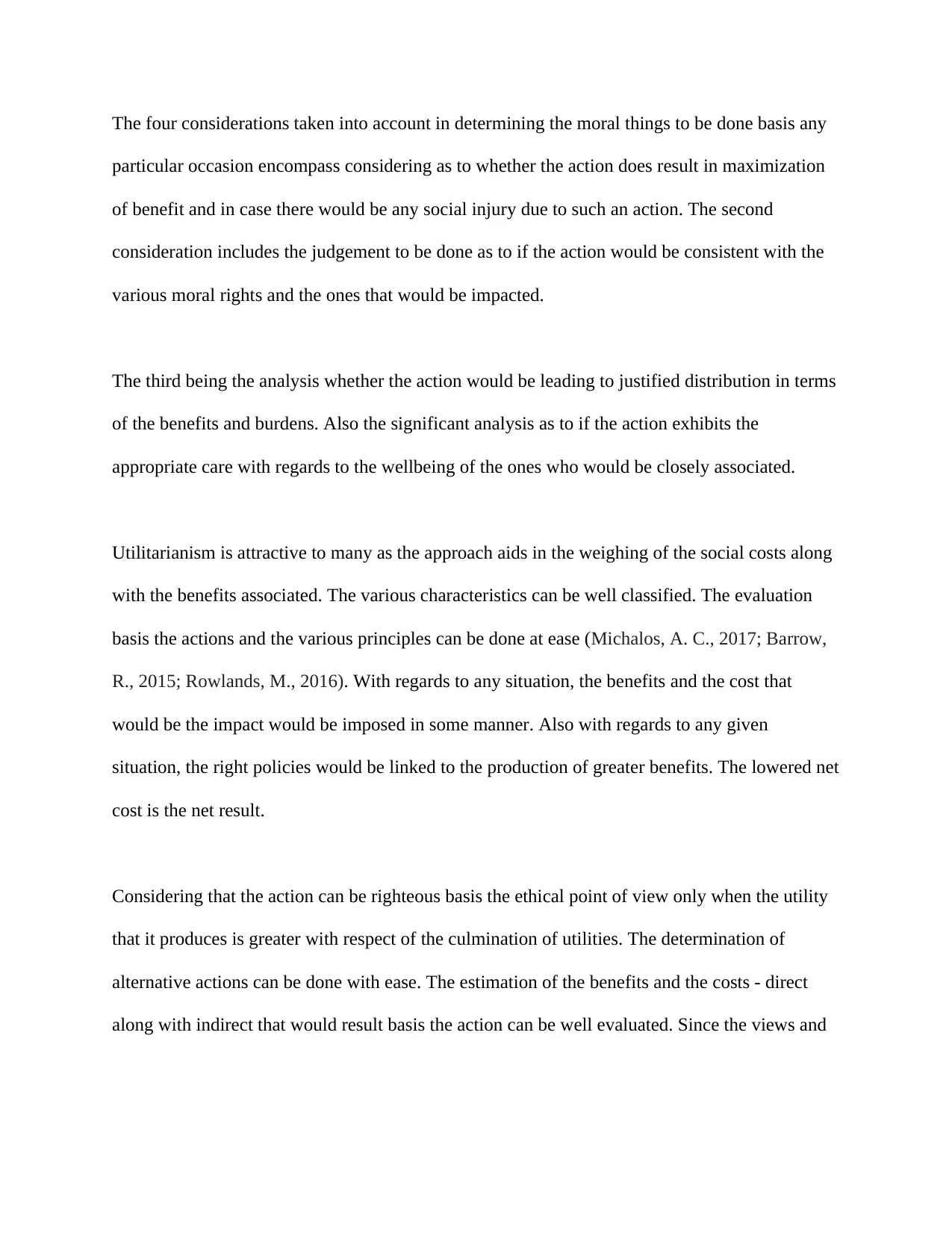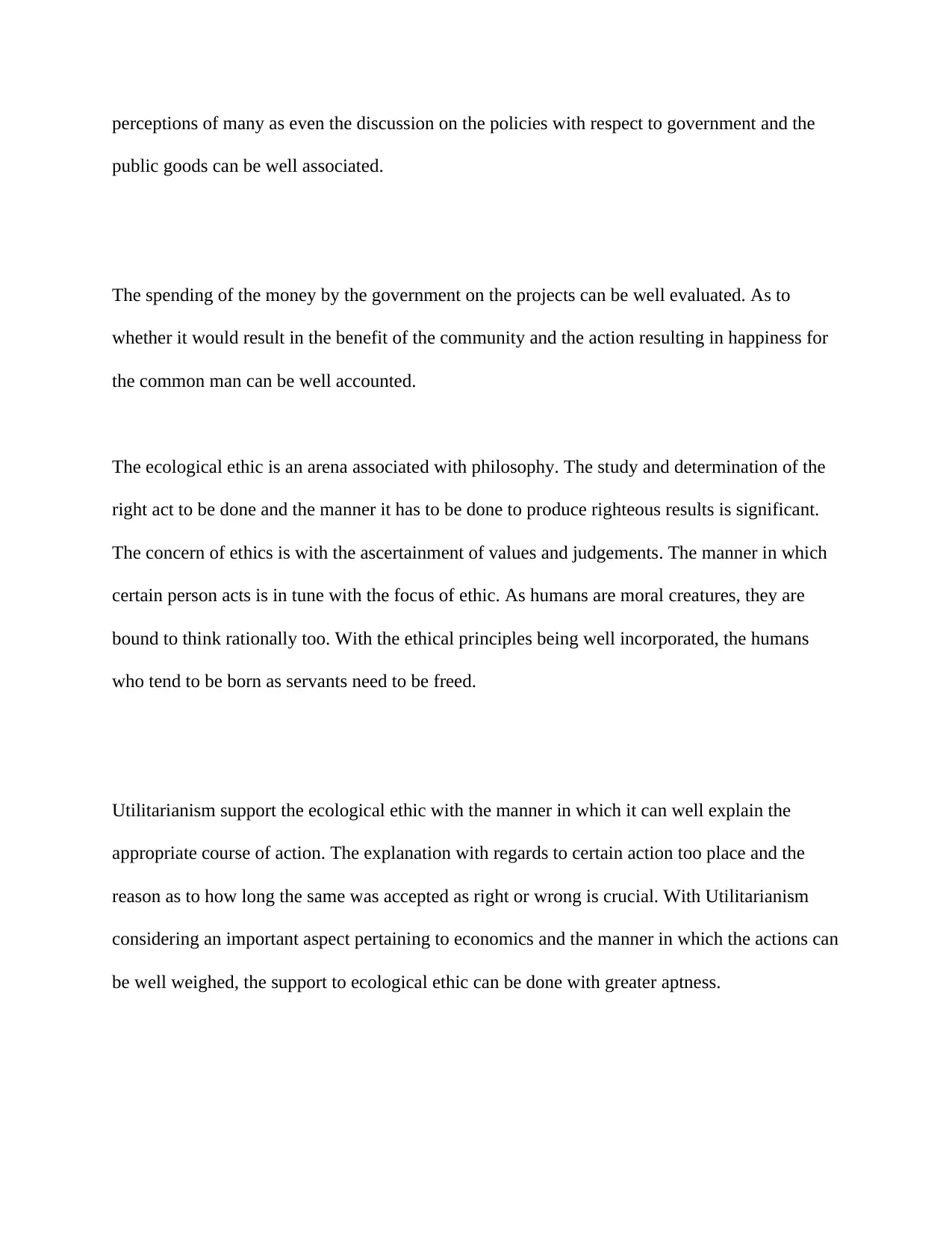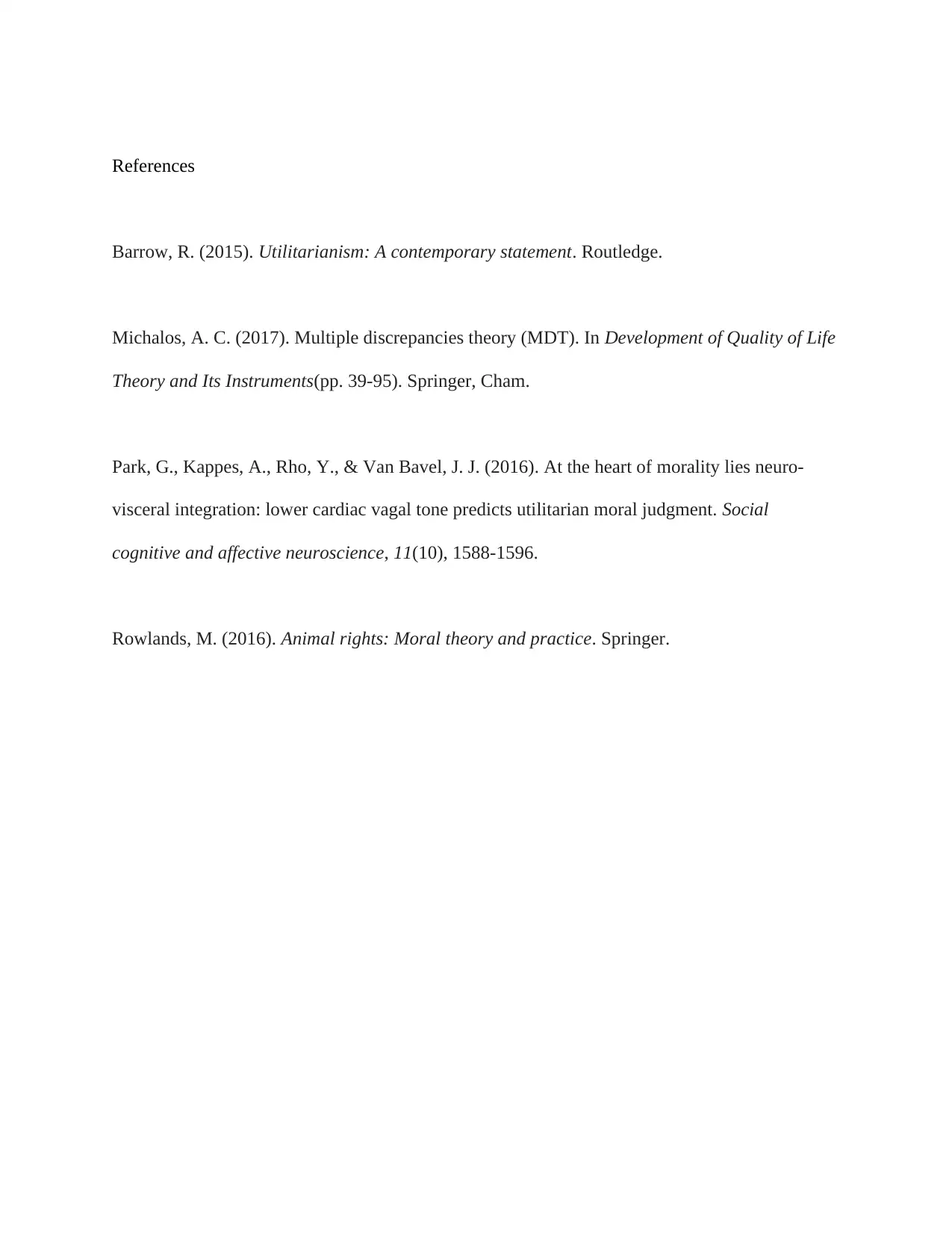Business Ethics: Traditional Utilitarianism
VerifiedAdded on 2019/09/18
|4
|951
|382
Essay
AI Summary
This essay delves into the concept of traditional utilitarianism, a moral theory focused on the consequences of actions. It explains how this philosophy, rooted in the 18th and 19th centuries, evaluates the ethical nature of actions based on their impact on society, aiming to maximize benefits and minimize costs. The essay outlines the key considerations in applying utilitarianism, such as maximizing benefits, respecting moral rights, ensuring fair distribution, and showing care for those affected. It also discusses how utilitarianism supports ecological ethics by providing a framework for weighing economic factors and evaluating the appropriateness of actions. The essay further explores how utilitarianism can be used to evaluate government spending and public policies, emphasizing the importance of actions that promote happiness and well-being for the community.

Business Ethics Assignment
Traditional Utilitarianism
Utilitarianism is associated with the moral theory that is result of consequences. It does assert
that the action would be ethically considered to be good or bad. This would rely on the impact
that it would create on the society. The action or the policy that is considered right would result
in the benefits and the lowered costs (Park, G., Kappes, A., Rho, Y., & Van Bavel, J. J., 2016).
The traditional utilitarianism does consider the definition that is well associated to philosophy of
the various ethics.
The philosophers hailing from the 18th and 19th century coined the concept. The reverse of
happiness would be the impact of the action not being right. The theory tends to be not linked to
egoism. The person who needs to pursue his/her self-interest is crucial.
The determination of the moral thing to be done at a particular occasion can be well determined
with the deployment of traditional utilitarianism. The consequence as that would take place in
case of any bad action would be resulting in the unhappiness. The consequences of any
alternative act are not considered to be great. Acts can be right or wrong basis the morals. The
consequences tend to be a significant ground in determination (Michalos, A. C., 2017; Barrow,
R., 2015). The comparison done with respect to the intrinsic values too helps in the
determination whether the act is moral or not.
Traditional Utilitarianism
Utilitarianism is associated with the moral theory that is result of consequences. It does assert
that the action would be ethically considered to be good or bad. This would rely on the impact
that it would create on the society. The action or the policy that is considered right would result
in the benefits and the lowered costs (Park, G., Kappes, A., Rho, Y., & Van Bavel, J. J., 2016).
The traditional utilitarianism does consider the definition that is well associated to philosophy of
the various ethics.
The philosophers hailing from the 18th and 19th century coined the concept. The reverse of
happiness would be the impact of the action not being right. The theory tends to be not linked to
egoism. The person who needs to pursue his/her self-interest is crucial.
The determination of the moral thing to be done at a particular occasion can be well determined
with the deployment of traditional utilitarianism. The consequence as that would take place in
case of any bad action would be resulting in the unhappiness. The consequences of any
alternative act are not considered to be great. Acts can be right or wrong basis the morals. The
consequences tend to be a significant ground in determination (Michalos, A. C., 2017; Barrow,
R., 2015). The comparison done with respect to the intrinsic values too helps in the
determination whether the act is moral or not.
Paraphrase This Document
Need a fresh take? Get an instant paraphrase of this document with our AI Paraphraser

The four considerations taken into account in determining the moral things to be done basis any
particular occasion encompass considering as to whether the action does result in maximization
of benefit and in case there would be any social injury due to such an action. The second
consideration includes the judgement to be done as to if the action would be consistent with the
various moral rights and the ones that would be impacted.
The third being the analysis whether the action would be leading to justified distribution in terms
of the benefits and burdens. Also the significant analysis as to if the action exhibits the
appropriate care with regards to the wellbeing of the ones who would be closely associated.
Utilitarianism is attractive to many as the approach aids in the weighing of the social costs along
with the benefits associated. The various characteristics can be well classified. The evaluation
basis the actions and the various principles can be done at ease (Michalos, A. C., 2017; Barrow,
R., 2015; Rowlands, M., 2016). With regards to any situation, the benefits and the cost that
would be the impact would be imposed in some manner. Also with regards to any given
situation, the right policies would be linked to the production of greater benefits. The lowered net
cost is the net result.
Considering that the action can be righteous basis the ethical point of view only when the utility
that it produces is greater with respect of the culmination of utilities. The determination of
alternative actions can be done with ease. The estimation of the benefits and the costs - direct
along with indirect that would result basis the action can be well evaluated. Since the views and
particular occasion encompass considering as to whether the action does result in maximization
of benefit and in case there would be any social injury due to such an action. The second
consideration includes the judgement to be done as to if the action would be consistent with the
various moral rights and the ones that would be impacted.
The third being the analysis whether the action would be leading to justified distribution in terms
of the benefits and burdens. Also the significant analysis as to if the action exhibits the
appropriate care with regards to the wellbeing of the ones who would be closely associated.
Utilitarianism is attractive to many as the approach aids in the weighing of the social costs along
with the benefits associated. The various characteristics can be well classified. The evaluation
basis the actions and the various principles can be done at ease (Michalos, A. C., 2017; Barrow,
R., 2015; Rowlands, M., 2016). With regards to any situation, the benefits and the cost that
would be the impact would be imposed in some manner. Also with regards to any given
situation, the right policies would be linked to the production of greater benefits. The lowered net
cost is the net result.
Considering that the action can be righteous basis the ethical point of view only when the utility
that it produces is greater with respect of the culmination of utilities. The determination of
alternative actions can be done with ease. The estimation of the benefits and the costs - direct
along with indirect that would result basis the action can be well evaluated. Since the views and

perceptions of many as even the discussion on the policies with respect to government and the
public goods can be well associated.
The spending of the money by the government on the projects can be well evaluated. As to
whether it would result in the benefit of the community and the action resulting in happiness for
the common man can be well accounted.
The ecological ethic is an arena associated with philosophy. The study and determination of the
right act to be done and the manner it has to be done to produce righteous results is significant.
The concern of ethics is with the ascertainment of values and judgements. The manner in which
certain person acts is in tune with the focus of ethic. As humans are moral creatures, they are
bound to think rationally too. With the ethical principles being well incorporated, the humans
who tend to be born as servants need to be freed.
Utilitarianism support the ecological ethic with the manner in which it can well explain the
appropriate course of action. The explanation with regards to certain action too place and the
reason as to how long the same was accepted as right or wrong is crucial. With Utilitarianism
considering an important aspect pertaining to economics and the manner in which the actions can
be well weighed, the support to ecological ethic can be done with greater aptness.
public goods can be well associated.
The spending of the money by the government on the projects can be well evaluated. As to
whether it would result in the benefit of the community and the action resulting in happiness for
the common man can be well accounted.
The ecological ethic is an arena associated with philosophy. The study and determination of the
right act to be done and the manner it has to be done to produce righteous results is significant.
The concern of ethics is with the ascertainment of values and judgements. The manner in which
certain person acts is in tune with the focus of ethic. As humans are moral creatures, they are
bound to think rationally too. With the ethical principles being well incorporated, the humans
who tend to be born as servants need to be freed.
Utilitarianism support the ecological ethic with the manner in which it can well explain the
appropriate course of action. The explanation with regards to certain action too place and the
reason as to how long the same was accepted as right or wrong is crucial. With Utilitarianism
considering an important aspect pertaining to economics and the manner in which the actions can
be well weighed, the support to ecological ethic can be done with greater aptness.
⊘ This is a preview!⊘
Do you want full access?
Subscribe today to unlock all pages.

Trusted by 1+ million students worldwide

References
Barrow, R. (2015). Utilitarianism: A contemporary statement. Routledge.
Michalos, A. C. (2017). Multiple discrepancies theory (MDT). In Development of Quality of Life
Theory and Its Instruments(pp. 39-95). Springer, Cham.
Park, G., Kappes, A., Rho, Y., & Van Bavel, J. J. (2016). At the heart of morality lies neuro-
visceral integration: lower cardiac vagal tone predicts utilitarian moral judgment. Social
cognitive and affective neuroscience, 11(10), 1588-1596.
Rowlands, M. (2016). Animal rights: Moral theory and practice. Springer.
Barrow, R. (2015). Utilitarianism: A contemporary statement. Routledge.
Michalos, A. C. (2017). Multiple discrepancies theory (MDT). In Development of Quality of Life
Theory and Its Instruments(pp. 39-95). Springer, Cham.
Park, G., Kappes, A., Rho, Y., & Van Bavel, J. J. (2016). At the heart of morality lies neuro-
visceral integration: lower cardiac vagal tone predicts utilitarian moral judgment. Social
cognitive and affective neuroscience, 11(10), 1588-1596.
Rowlands, M. (2016). Animal rights: Moral theory and practice. Springer.
1 out of 4
Related Documents
Your All-in-One AI-Powered Toolkit for Academic Success.
+13062052269
info@desklib.com
Available 24*7 on WhatsApp / Email
![[object Object]](/_next/static/media/star-bottom.7253800d.svg)
Unlock your academic potential
Copyright © 2020–2025 A2Z Services. All Rights Reserved. Developed and managed by ZUCOL.



